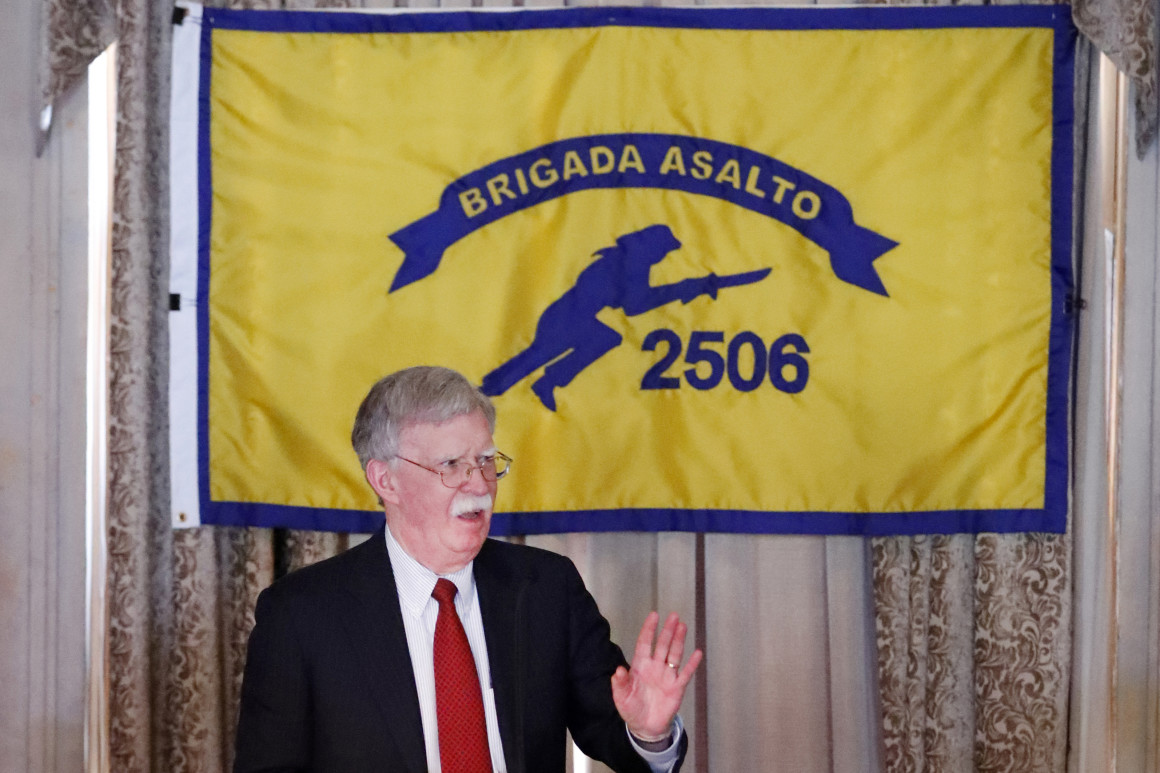On April 17, US national security advisor John Bolton announced a new set of sanctions on Cuba, Venezuela and Nicaragua. He was addressing participants of the Bay of Pigs invasion, a failed CIA plot to overthrow Fidel Castro. In his address, Bolton declared, “We must all reject the forces of communism and socialism in this hemisphere — and in this country…Together, we can finish what began on those beaches, on those famous days in April, 58 years ago today”.
He also stated that the Monroe doctrine, the basis upon which the US supported military coup d’etats and extreme right wing dictatorships in Latin America during the Cold War, is “alive and well”.
The latest sanctions on the “troika of tyranny” as the Trump administration likes to call Cuba, Venezuela and Nicaragua, is part of the sustained campaign led by the US government to destabilize these countries by creating economic crisis with the goal of forcing regime change. The existential threat that Cuba continues to pose to the US, 65 years after the revolution, is clear.
On the same day, US secretary of state Mike Pompeo defended harsh measures against Cuba, claiming the the latter played a key role in sustaining the government of Nicolás Maduro in Venezuela.” Cuban military intelligence and state security services today keep Maduro in power” he said.
The US and its allies have made desperate attempts to oust the democratically-elected president of Venezuela, Nicolás Maduro, by propping up the self-proclaimed interim president, Juan Guaidó, tightening the economic sanctions on Venezuela and supporting violent acts of sabotage to vital infrastructure in the country. However, they have not been able to shake the will of the Venezuelan people. The three-pronged attack on these three Latin American and Caribbean nations seeks to scale up their prior efforts.
A central part of the sanctions is the full activation of Title III of the Helms-Burton Law of 1996. This allows US nationals who owned property in Cuba that was seized by the Cuban government after the revolution in 1959 to sue US and foreign companies that profit from these properties. Title III has been suspended by the US government every 6 months since the law came into effect in 1996.
The measure is controversial even among the allies of the US as businesses in Canada and several European countries have billions of dollars of investments in Cuba and could potentially be targeted by Title III. EU officials Federica Mogherini and Cecilia Malmstrom, who work in trade and foreign affairs sectors, have threatened to file a case with the World Trade Organization. In a statement, Mogherini, Malmstrom and Canadian foreign minister Chrystia Freeland said the “extraterritorial” application of this title would be violating international law.
The other measures include restricting the sending of ‘remesas.’ which is money that migrants send back to their families and close ones in their home countries. The Trump administration announced that Cubans who live and work in the US can only send home $1,000 per semester.
New restrictions on visas for non-family travel will also be implemented. During Barack Obama’s tenure, the near complete ban on recreational travel to Cuba was modified and US citizens were allowed to apply for visas and travel to Cuba individually or on a family or group trip as long as their trips were “educational” and had “people-to-people interactions”. The measure opened the doors for many to travel to the island, learn about the history and culture and interact with the Cuban people.
During his campaign for president, Donald Trump declared he would roll back this policy and return to the hard-line approach, in an attempt to appeal to the right-wing Cuban-American community in Miami. Even before the latest announcements, the administration had attempted to restrict visas and travel to Cuba.
The US will also supposedly take steps to limit the supply of subsidized Venezuelan oil to Cuba.
The other measures specifically target Venezuela and Nicaragua. Pompeo announced that sanctions will be extended to the Central Bank of Venezuela. Its access to US currency will be cut off and its ability to conduct international financial transactions will be limited. Venezuela has already suffered billions of dollars in losses due to the oppressive economic sanctions enacted by the US, Canada and EU countries.
The US also announced sanctions against Laureano Ortega, son of Nicaraguan president Daniel Ortega, vice-president Rosario Murillo and the Nicaraguan bank Banco Corporativo SA (Bancorp). Their US assets have been frozen and people in the US are prohibited from engaging in transactions with them. A press release from the secretary of state called the individuals “enabler[s] of the Ortega regime’s corruption”.
The harsh sanctions were widely condemned by the governments and citizens of these countries, as well as social movements across Latin America and the Caribbean.
The Revolutionary Government of Cuba said in a statement: [Washington] accuses Cuba of being responsible for the strength and conviction shown by the Bolivarian and Chavista government, the people of this country and the civic-military unity that defend the sovereignty of their nation. They brazenly lie when alleging that Cuba has thousands of military and security personnel in Venezuela, influencing and determining what happens in this brother country. It is shameless enough to blame Cuba for the economic and social situation that is faced in Venezuela after years of brutal economic sanctions, conceived and applied by the United States and its allies, in order to economically strangle it and generate suffering in the population”
The government of the Bolivarian Republic of Venezuela also rejected the latest measures. In an official communique, they denounced the illegal and arbitrary measures against their Central Bank: “This new inhumane attack is directly against all of the Venezuelan people, threatening its peace and stability. The United states does not want democracy in Venezuela, it threatens it in order in order to achieve its collapse and start a recolonization”.





